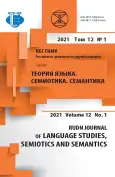Fashion Vocabulary: Borrowing, Adapting and Rethinking
- Авторлар: Nedopekina E.M.1
-
Мекемелер:
- Peoples’ Friendship University of Russia (RUDN University)
- Шығарылым: Том 12, № 1 (2021)
- Беттер: 105-120
- Бөлім: FUNCTIONAL GRAMMAR & FUNCTIONAL SEMANTICS
- URL: https://journal-vniispk.ru/2313-2299/article/view/323397
- DOI: https://doi.org/10.22363/2313-2299-2021-12-1-105-120
- ID: 323397
Дәйексөз келтіру
Толық мәтін
Аннотация
Fashion is a rather significant mechanism that organizes the life of any society and regulates the social behavior of people. It subordinates not only the choice of clothing, interior, personal hygiene items, gastronomic tastes, musical preferences, but also the way of thinking, the formation of criteria for assessing the phenomena of reality. At the same time, fashion is not only a powerful social regulator, but also a significant cultural phenomenon, the study of which is of particular importance nowadays. In this context, the vocabulary of fashion is interesting, as, on the one hand, it enriches the Russian language due to the abundant borrowing of foreign words, on the other hand, it indicates how actively the Russian language adapts new names for fashion items, and demonstrates how Russian mentality and culture accept this vocabulary. In order to consider the Russian vocabulary in the sphere of “fashion” in all three aspects, it is important to trace the derivation of the lexical meaning of the denotations of the “fashion” semantic field in their connection with the historical period and the change in the native speakers’ way of thinking in different historical times of the country. To this end, it is necessary to turn to the etymology of the basic elements of the Russian wardrobe, identify their coherence with the gender of their owners and trace how this coherence has been changing over time, as well as analyze the ways of grammatical adaptation of borrowed vocabulary in the Russian language, and finally, note the functional specifics of the same lexemes in Russian and other donor languages.
Негізгі сөздер
Авторлар туралы
Ekaterina Nedopekina
Peoples’ Friendship University of Russia (RUDN University)
Хат алмасуға жауапты Автор.
Email: nedopekina_em@rudn.ru
PhD in Philology, Associate Professor of General and Russian Linguistics Department
6, Miklukho-Maklaya str., Moscow, Russian Federation, 117198Әдебиет тізімі
- Lunkova, L.N. & Bukina, L.M. (2020). Semantic Anglicisms in French Internet Forum. RUDN Journal of Language Studies, Semiotics and Semantics, 11(1), 92—101. doi: 10.22363/23132299-2020-11-1-92-101. (In Russ.).
- Perfilieva, N.V. & Hu, Peipei (2012). Word-building Patterns in Neologisms-Loanwords in Russian and Chinese. RUDN Journal of Language Studies, Semiotics and Semantics, 3(4), 69—75. (In Russ.)
- Krylov, G.A. (2004). Etymological dictionary of the Russian language. St. Petersburg. (In Russ.).
- Ushakov, D.N. (1935—1940). Explanatory dictionary of the Russian language: Vol. 1. Moscow. (In Russ.).
- Ozhegov, S.I. & Shvedova, N.Yu. (1995). Explanatory dictionary of the Russian language: 80,000 words and phraseological expressions. Moscow. (In Russ.).
- Enthusl, J. (2019). Fashionable body. Moscow: New Literary Review. (In Russ.).
- Vasmer, M. (2004). Etymological dictionary of the Russian language in 4 volumes, O.N. Trubachev (Tr., ed.). Moscow: Astrel—AST. (In Russ.).
- Berneker, E. (1908—1913). Slavisches etymologisches Wörterbuch. Heidelberg. (In Germ.).
- Efremova, T.F. (2000). New dictionary of the Russian language. Explanatory and derivational. Moscow: Russian language. (In Russ.).
- Shansky, N.M. (1965). Etymological dictionary of the Russian language. Moscow: Publishing house of Moscow State University. (In Russ.).
- Tishkov, V.A. (1998). Nations and religions of the world. Moscow: Great Russian Encyclopedia. (In Russ.).
- Dal, V.I. (1994). A dictionary of the living Russian language (in 4 vol.). Moscow: Terra. (In Russ.).
- The Big Explanatory Dictionary of the Russian Language: A—Ya (1998). St. Petersburg: Norint. (In Russ.).
- Hesychii Alexandrini Lexicon (1953). hrsg. von Kurt Latte. Α—Δ. Kopenhagen.
- Encyclopedia of fashion and clothing. EdwART. (2011). URL: https://rus-fashiondict.slovaronline.com/ (accessed: 27.06.2020).
- Frolov, B.Ye. (2003). Materials for the “Military lexicon of the Kuban Cossacks” In Dikarevskie readings: materials of the Regional scientific conference, Krasnodar, 10—13 October, 2003, M.V. Sementsov (ed.). Krasnodar: Kribibkollector.
- National corpus of the Russian language. URL: ruscorpora.ru (accessed: 20.07.2020).
- Calasibetta, C.M. & Tortora, P. (2010). The Fairchild Dictionary of Fashion. NY: Fairchild Books.
- Cambridge Advanced Learner’s Dictionary (2008). Cambridge: Cambridge University Press.
- Soboul, A. (1972). The Sans-Culottes: The Popular Movement and Revolutionary Government, 1793—1794. New York: Doubleday. pp. 2—3.
- Explanatory online dictionary: Collins Online English Dictionary. URL: https://www.collinsdictionary.com/dictionary/english (accessed: 27.06.2020).
- Explanatory online dictionary: Wiktionary. URL: https://ru.wiktionary.org/wiki/%D0%BA% D1%80%D0%BE%D0%BF-%D1%82%D0%BE%D0%BF (accessed: 27.06.2020).
Қосымша файлдар









